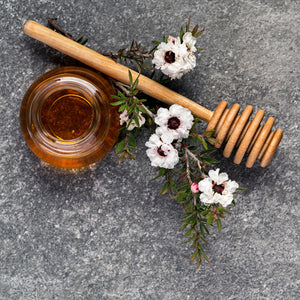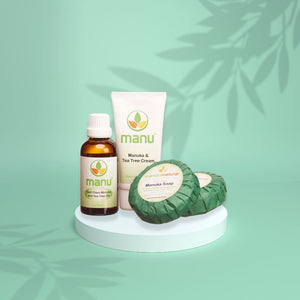
Manuka honey - every medicine cabinet should have it
We said medicine cabinet but most people keep their honey in the pantry, here we are referring to Manuka UMF honey which has exceptional healing properties and should warrant a higher place in your home than the pantry.
You see, certified Manuka UMF honey is not something you put on toast for breakfast it should be put aside for treating skin conditions and sore throats because it has special healing properties. (it is also a bit too expensive to put on toast efery day)
Honey as a medicine has been around forever, but it has reemerged in modern times has both a “superfood” and as a powerful medicine supported by science.
As with most products, there is a range in the quality — and therefore healing properties — of honey. The honeybear that you grew up with will do in a pinch, though there has been some questions regarding the quality and added ingredients to many commercial brands. But manuka honey is the gold standard when it comes to providing a hefty dose of healing and health benefits.
Manuka honey, native to New Zealand, has antibacterial, antiviral, anti-inflammatory and antioxidant properties that set it apart from traditional honey. In fact, it has traditionally been used to heal wounds, soothe sore throats, prevent tooth decay and improve digestive issues, according to Healthline.
Produced by bees that pollinate the flowers of the manuka bush (Leptospermum scoparium), the honey's enhanced antibacterial properties weren't identified and studied until the 1980s. And while you may be thinking of all the great things you’ve heard about raw honey, manuka honey is even better. Additional compounds — methylglyoxal (MGO), dihydroxyacetone (DHA), and a few others — make it even more beneficial for both internal and topical use.
Speaking of topical use, manuka honey is a pantry staple — like coconut oil and apple cider vinegar — that does wonders for the skin. Some folks get fancy by whipping up a blend of ingredients — like oats and turmeric — with the manuka honey for a DIY face mask. Other people swear by washing their face with it.
Why? Well, because manuka honey has been shown to increase the production of collagen (which in turn, increases skin elasticity), while reducing dark spots, and acting as an anti-inflammatory to help treat skin conditions like rosacea and acne. Not to mention, it locks in moisture, MindBodyGreen explains.
Aside from beautification, manuka honey helps to promote restful deep sleep by slowly releases the glycogen needed for essential bodily functions during sleep. Adding honey to milk at bedtime helps the body release melatonin into the brain, which is necessary for deep sleep, Dr. Axe suggests.
In 2007, manuka honey was approved by the FDA as an option for wound treatment, thanks to its known antibacterial and antioxidant properties. Multiple studies have shown that the viscous liquid can amplify the regeneration of tissue and decrease pain in patients suffering from burns. Additionally, manuka honey is effective at treating wound infections caused by antibiotic-resistant strains, such as Staphylococcus aureus (MRSA), Healthline reports.
Perhaps the most common use in the western world for honey is soothing sore throats — it’s in most cough drops, after all — and manuka honey is no different. Not only do its antibacterial, antiviral, and anti-fungal properties create the perfect trifecta for treatment, but its thick texture coats and soothes the throat, helping destroy the harmful bacteria in its path. Manuka honey can help prevent coughs from keeping you up at night, too. One tablespoon right into your mouth is all you need, MindBodyGreen reports.
Lastly, manuka honey is lauded for its gut health benefits — especially SIBO (small intestine bacterial overgrowth), low stomach acid and acid reflux or GERD. Experts say that it can balance the bad bacteria in your gut which can heal and soothe digestion, help prevent infections and build immunity. It’s also effective in killing the bacteria responsible for stomach ulcers (Helicobacter pylori).
Before you jet to Whole Foods to stock up on manuka honey, there are a few things you should know. First, it is usually sold with ratings, numbers or symbols that indicate the antibacterial strength of active honey.
For most people many of these numbers are very confusing and are sometimes used to disguise the true antibacterial value of Manuka honey.
Therefore the only numerical description that we recommend is the UMF/Mg (methylglyoxal content) classfication which means it is produced, processed, packed into pots, labeled and tested by a government approved laboratory, certifying its purity and authenticity all taking place in New Zealand, the home of Manuka honey.
Without that you could literally be buying corn syrup - proven as a major ingredient in cheap 'manuka' honey
If you want to use manuka honey as a food or tonic, then there's no need to buy a "more active" type, but it might be wanted if using to help treat skin conditions; acne, eczema and seborrheic dermatitis or to heal a sore throat. Then you'd need to get something with a high level of antimicrobial activity.



Leave a comment